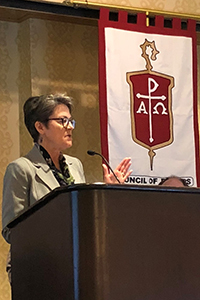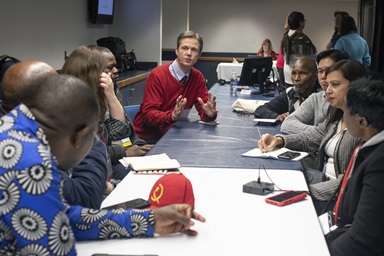An anxious yet hopeful church is watching as United Methodist bishops finalize their recommendations for the denomination’s future, Bishop Bruce R. Ough told his episcopal colleagues.
More than 100 active and retired bishops are beginning a week of deliberating on their final proposals to next year’s special General Conference. The bishops called the special meeting of the denomination’s top policymaking body to address decades of division over how the church should minister with LGBTQ individuals.
Ough said he expected the denomination, for the most part, to take its cues from its bishops.
“If we fight and retreat to our various corners and turfs, the church will follow our example and fight,” he said in a sermon that doubled as his final address to the Council of Bishops as the body’s president. He also leads the Dakotas and Minnesota conferences.
“If we flee and pretend we are not in a truly different place as a global church, the church will follow our example and flee. If we freeze and say it is not our responsibility to guide our people into unchartered territory, the church will follow suit, freeze and miss this transformative moment.”
Most of the bishops’ deliberations will take place behind closed doors this week. They plan to make public a summary of their recommendations after their meeting concludes May 4.
The bishops are in a “high-stakes moment,” Ough told those gathered.
Already a handful of congregations have taken steps to leave the denomination over the debate.
Various unofficial advocacy groups are also staking out their positions in the run-up to the special General Conference. Among those assembled at the bishops’ opening worship were members of Love Prevails, an unofficial group that advocates for the full inclusion of LGBTQ individuals in all aspects of church life, and the United Methodist Queer Clergy Caucus, an unofficial group made up of LGBTQ clergy in the denomination.

Bishop Sally Dyck welcomes bishops and other visitors to the Northern Illinois Conference for the spring 2018 Council of Bishops meeting in Chicago. Photo by Anne Marie Gerhardt, Northern Illinois Conference.
The bishops have a tight timeline. At the bishops’ request, the Judicial Council — the denomination’s top court — will meet May 22-25 to address any requests stemming from the bishops’ recommendations.
The church court also will determine whether other petitions — in addition to the report from the Council of Bishops — can be submitted prior to the convening of the special General Conference. One of the questions before the bishops this week is whether to request an oral hearing before the Judicial Council. The deadline for petitions to the special General Conference is July 8.
“What our church desperately needs at this moment, 50 years after creating The United Methodist Church, is a Council of Bishops that resists fixing the church, practices holy imagination, refuses false dichotomies and single-narrative thinking and reframes the questions,” Ough preached.
That the bishops’ meeting is in Chicago offers an interesting coincidence, pointed out Bishop Sally Dyck, whose Northern Illinois Conference is hosting the meeting. The last time the bishops gathered here was the Council of Bishop’s first fall meeting in 1968 after The United Methodist Church’s formation.
The 2016 General Conference, by a 428-405 vote, authorized the bishops to form a commission to help them avoid a denominational breakup over homosexuality.
Since January 2017, the 32-member Commission on a Way Forward has met almost monthly and received periodic feedback from the Council of Bishops. Three bishops serve as commission moderators facilitating discussion, and nine bishops — including one elected last year — serve as commission members.
At present, the denomination’s official stances on homosexuality declare the practice of homosexuality “incompatible with Christian teaching,” prohibit clergy from officiating at same-gender unions and preclude the ordination of “self-avowed, practicing” gay clergy. However, some pastors and conferences have been defying these prohibitions.
Based on feedback from the bishops, Ough said, the commission has focused on two possible plans that would change the status quo.
The one-church model would remove current restrictions and leave questions of ordination and marriage closer to the conference and local-church levels.
The multi-branch model would allow conferences to choose among three connectional conferences for affiliation. The connectional conferences would align based on theology or perspective on LGBTQ ministry — be it traditionalist, progressive or allowing for a variety of approaches. This plan would require multiple amendments to the denomination’s constitution.
Still, at various points, bishops have said a third possibility is still on the table — a traditionalist plan that would maintain the denomination’s restrictions and put greater emphasis on enforcement.
“We never took off the table the ideas and more importantly the values in all three models,” Ough told United Methodist News Service after worship. “But at this meeting, we will be responding primarily to the report from the commission, which has focused on two models.”
He added the council may choose to adopt the report or may choose to advance other ideas. Also still to be determined is whether the bishops will move forward one or multiple plans.
“It’s still quite open,” Ough said.
Ough preached to the bishops from Mark 10:35-52, which features two very different understandings of power. In the first part of the passage, the disciples James and John ask Jesus to sit at the savior’s right and left hand when he comes into glory. In the second part, the blind Bartimaeus asks Jesus for mercy and for help to see. When healed, Bartimaeus decides to follow Christ.
In both cases, Jesus first addresses disciples and blind man alike by asking: “What do you want me to do for you?”
Ough told the bishops that Jesus would be present with them throughout their deliberations. “I pray our response will reflect Bartimaeus’ spirit: Heal us, transform us, empower us to move beyond one issue to follow you, O Christ, on the one way.”
That message resonated with Bishop Debra Wallace-Padgett, who leads the North Alabama Conference and is a commission member.
“I am grateful for Bishop Ough’s reminder that Jesus will be with us all week,” she said. “Also, I appreciated his focus on depending on the Holy Spirit to lead us in finding a way forward.”
Retired Congolese Bishop David Yemba, one of the Way Forward Commission moderators, also took hope from Ough’s sermon.
“It was a powerful message, which is helping the council to have a clear focus on what we are called to do and to be,” he said.
Hahn is a multimedia news reporter for United Methodist News Service. Contact her at (615) 742-5470 or [email protected]. To read more United Methodist news, subscribe to the free Daily or Weekly Digests.
Like what you're reading? Support the ministry of UM News! Your support ensures the latest denominational news, dynamic stories and informative articles will continue to connect our global community. Make a tax-deductible donation at ResourceUMC.org/GiveUMCom.




